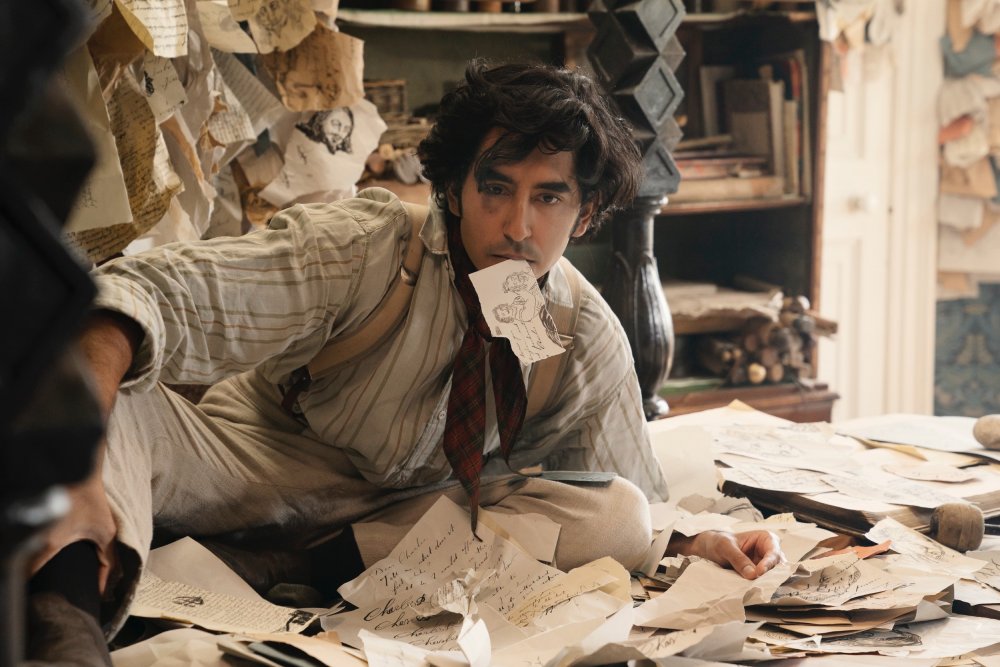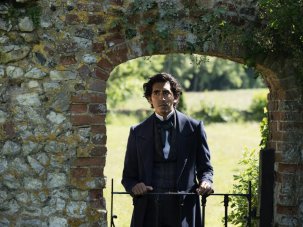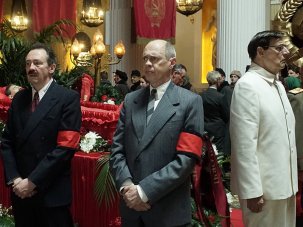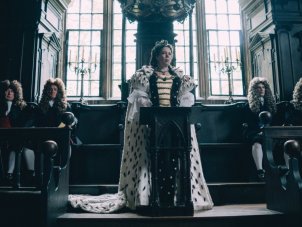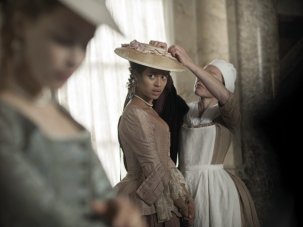It’s a scorching summer day in July 2018 when Sight & Sound visits the east London set of The Personal History of David Copperfield. Ensconced inside a gloomy bottling factory that could easily double as a Dickensian workhouse, with fake soot on the floor and clanking machinery operated by ragged youths dressed in patented – and, surely, stiflingly hot – ‘Victorian urchin’ attire, director Armando Iannucci cuts a calm figure amid the hurly-burly. Noticing two journalists hovering in the background, he nods, deadpan. “Welcome to post-Brexit Britain.”
The Personal History of David Copperfield is released in the UK on 24 January 2020.
Iannucci’s reputation is precisely for this kind of skewering satire, as writer, producer or showrunner, lampooning the political and social mores of the day in the UK and US, through hit comedy shows such as The Thick of It and Veep. A move into film directing still hit the same targets with unerring accuracy, with the likes of In the Loop and The Death of Stalin. What’s perhaps less known is his abiding love of Charles Dickens. Yet he presented a 2012 BBC TV show Armando’s Tale of Dickens and even lauded the great man on Radio 4’s Great Lives in 2003.
David Copperfield, an epic, meandering tale of a young orphan’s despairs, triumphs and gradual self-actualisation, is far less frequently adapted for the screen than the likes of Oliver Twist or Great Expectations. Yet Iannucci talks of it as “a film I always wanted to make”; he and co-writer Simon Blackwell have made several radical changes to their adaptation, not least with the groundbreaking casting of British Asian actor Dev Patel in the title role. Just ahead of opening the 2019 London Film Festival, he sat down and talked about his own personal history with Dickens’s own self-professed “favourite child” among his works.
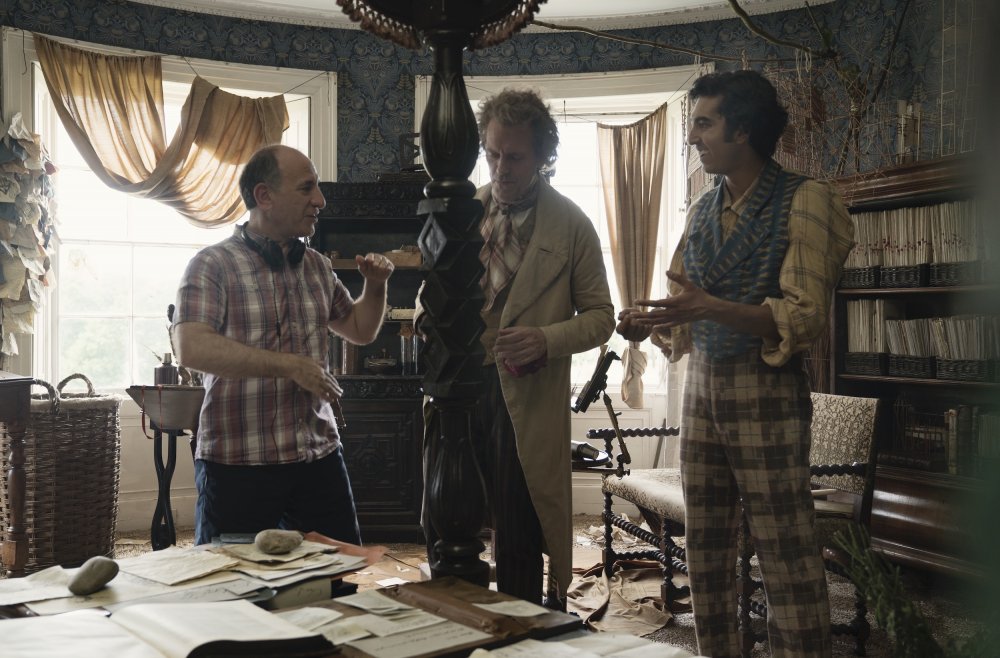
Armando Iannucci directing Hugh Laurie (playing Mr Dick) and Dev Patel as David Copperfield
Some people may know of your love for Dickens, but for those only aware of your more political, satirical work – The Thick of It, Veep, The Death of Stalin – in terms of tone and theme and storyline, this might be seen as a real departure. Did you see it as that?
You know, I didn’t, but when you make stuff, whether it’s film or television, you have no real perception of how others are reading it. You just hope that if you’ve made what makes you laugh, it makes others laugh. I mean, I did a show on Channel Four (The Armando Iannucci Shows, 2001), which was less about politics and more about just the stuff of life. And Alan Partridge isn’t, you know, swearing and politics.
So this wasn’t a conscious, “I’ve got to throw a curveball now”. It was more that I admired Dickens’s vision and ability to be an entertainer, as well as someone who could comment on the state of the nation at the same time.
The novel is famously Dickens’s own favourite, and perhaps his most autobiographical work. The film too feels more intensely personal than overtly political.
This is so much more optimistic. And I wanted to make something happy and positive, but still not cutting the corners or trying to dilute the sadness of David’s life.
Maybe it’s a response to the kind of the toxic conversations we’re having in politics at the moment. I didn’t want to engage with that. OK, that’s one way of seeing what Britain is like, divided and angst-ridden, putting up barriers.
Or you could have another illustration of why I love this country: this vibrancy, this liveliness, eccentricity and humour. I feel lucky to have been born in Britain and to be able to work in its fantastic comedy heritage and industry.
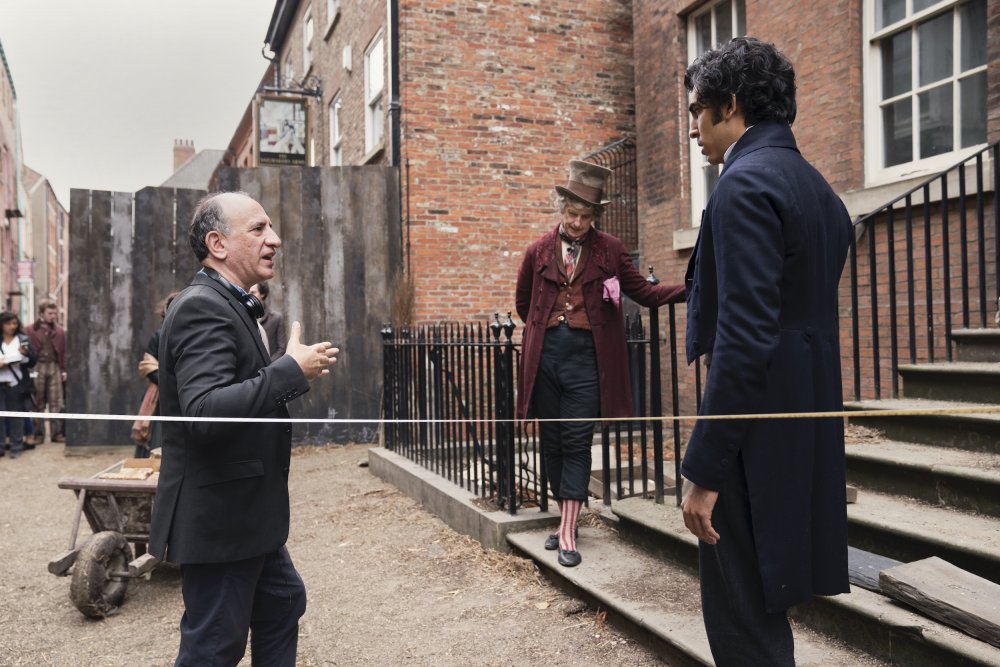
Iannucci directing Peter Capaldi (as Mr Micawber) and Patel
TV and film versions of Dickens’s books are almost their own cottage industry, and there’s definitely an overall, genteel ‘house style’ to period literary adaptations in general – one that your film almost wholly rejects. What was your approach?
Re-reading David Copperfield, I was struck by how contemporary it felt, and how psychologically interesting it was. The people in this film are living in their present day and have to behave and act accordingly. Not only that, but their city is London, which is at the centre of a big industrial revolution. It’s new, and it’s frightening if you lose your way. But also it’s exciting. And that’s how it should feel.
So I said to everyone in the production and the cast, no one needs to read the book, or watch any adaptations because I don’t want anyone to have any preconceptions. I want it to look like costume dramas have never existed, and therefore, there’s no template as to how you go about make one.
Do you admire any of the previous Dickens screen adaptations?
David Copperfield is a difficult story to adapt, because it sort of doesn’t have a beginning, middle and end. So for that reason, I think there aren’t that many film adaptations. The [1935] George Cukor one is the best, I think.
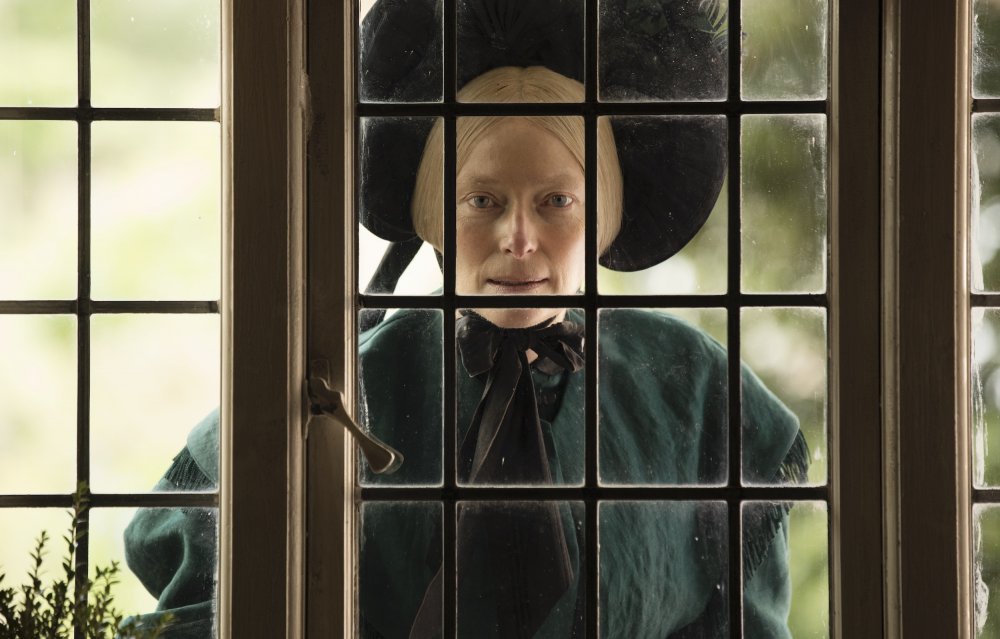
Tilda Swinton as Betsey Trotwood
The other thing in the book is that key characters like Uriah Heep and Mr Micawber and Betsey Trotwood actually disappear for hundreds of pages. And then our question was, OK, how do we keep them always at the centre of David’s world? The hardest part of the script actually was to give it a structure and it involved rewriting some of the story. So there are elements that may have happened in the book to other characters.
I’m assuming no prior knowledge in terms of the audience, you know. It’s not for study, it’s a film, it’s an entertainment.
It would be a brave teacher to give this film to their students as an example of anything other than a fairly radical interpretation of the original text…
Oh, well, thank you. That’s what we’ve tried to do. I showed it to members of the Dickensian Society, and they said that actually it captures the spirit of the book. That that was the idea. It’s the language of the book, the humour, not the story.
Too many adaptations throw everything else out and stick to the story. The story is actually the least interesting part.
You’ve clearly used some of Dickens’s most famous lines, but you and [co-writer] Simon Blackwell have also tried to write in Dickens’s own style and idiom. How much of a challenge was that?
We tried to pull as many as possible from Dickens, if not from Copperfield then from his other writings. So, metaphors like “the melancholy mad elephants”, that’s from Hard Times, and so on. And we’ve done our own, but you know, his language is so modern that actually when you try and kind of replicate it, it doesn’t sound like you’re trying to put on a kind of an old-fashioned style.
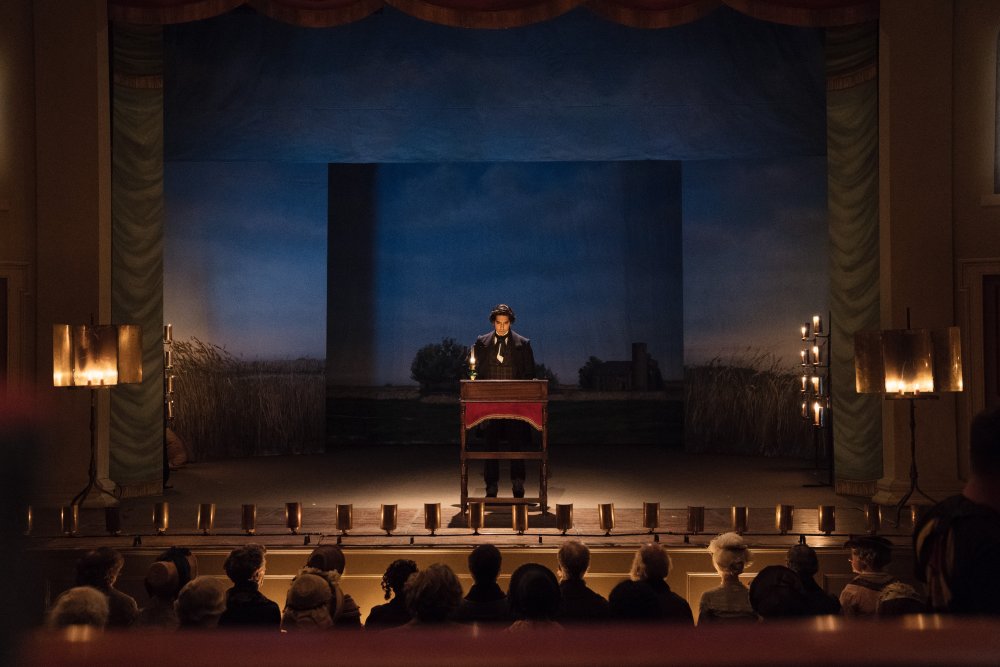
The Personal History of David Copperfield (2019)
The element of David writing, or rewriting his life story, is there in the novel. But you push it even further here, starting with David reciting the first words of the novel on stage to an audience. He’s like a showman, performing it…
In the book David keeps commenting, “You wouldn’t believe this, but this actually happened.” This is a novel. He’s aware that he is writing episodes from his own life, and therefore has some control over how they’re presented. It’s the whole thing about, ‘Who am I?’ And I’ll keep refashioning myself, and then I’ll be a storyteller. And therefore, the stories I’m telling about my childhood, am I embroidering them?
As David gets older, we see how he’s actually now beginning to shape his memories and stories as a way of just surviving. It’s a way of digging himself out of misfortune. I found that intriguing.
You also use that as the basis to really play with a whole host of cinematic techniques, from models and visual effects to a silent movie sequence.
So many literary adaptations make everything very literal. They tell me what happened, not what went on in [the characters’] minds.
So here, when, for example, David is in love with Dora, he actually sees her everywhere, even up in the clouds. I kind of like the messiness, generally, because it’s a messy book. By the end, you want to feel that you’ve seen a life lived, and life is a kind of a mess.

Anthony Welsh as Ham and Paul Whitehouse as Mr. Peggotty
The film’s colour-blind casting is another very atypical move, and you fully embrace a mix-and-match ethnicity between family members like Mr Wickfield (Benedict Wong) and his daughter Agnes (Rosalind Eleazar), or Steerforth (Aneurin Barnard) and his mother (Nikki Amuka-Bird). And obviously Dev Patel as David. What was the rationale?
That’s something I’ve noticed in theatre for the last ten or 15 years and nobody goes, “I don’t get it.” So I just thought, why not do that?
Actually, I’ve seen too many films where they’ve tried to do a kind of diversity in the casting, but by trying to explain why that person is that person, they brought someone over from this country to be there and so on. I had no kind of game plan as to who played what, so I just felt, well, why shouldn’t I choose from 100 per cent of the acting community?
Did you notice any pushback, either in initial casting, or audience reaction?
The thing I noticed when we were first showing it in Toronto is that people mentioned it in advance of the film, and then dropped it afterwards. If I’m trying to make this feel contemporary, it should feel like Britain today, where people have many national ethnic backgrounds.
Maybe myself coming from an Italian background, I was able to talk about that thing of when families come over and grow up here, and how integrated you feel. And at some point, it stops becoming a thing that you think about, and I wanted to inject that.

Aneurin Barnard as Steerforth with Dev Patel
But Dev was always David for you?
Dev was the only person I thought of from day one. I had no Plan B at all. I mean, if he’d said no, I would’ve had to come up with one. I hadn’t met him, but obviously I’d seen him right from Skins, and I knew he could do the comedy, the awkwardness. And I’d seen him in Lion being very strong and focused and determined, and that’s what made me think “That’s David Copperfield.”
David in the film needs to grow from being awkward and uncertain but funny and talented and slightly kind of swayed by the people he’s mixing with. And then taking control of events and becoming a kind of charismatic but purposeful figure. And, you know, we’re always shooting out of sequence, so seeing Dev do that on a weekly basis, going from one to the other, was great.
Your David is a much more active character than in the novel. So, for you, was David Copperfield here also in a way Charles Dickens?
In the book, David is just often a passive observer. But in [film], David is so prominent that he has to fizz. We thought the way to bring David alive is to bring an element of Dickens into him.
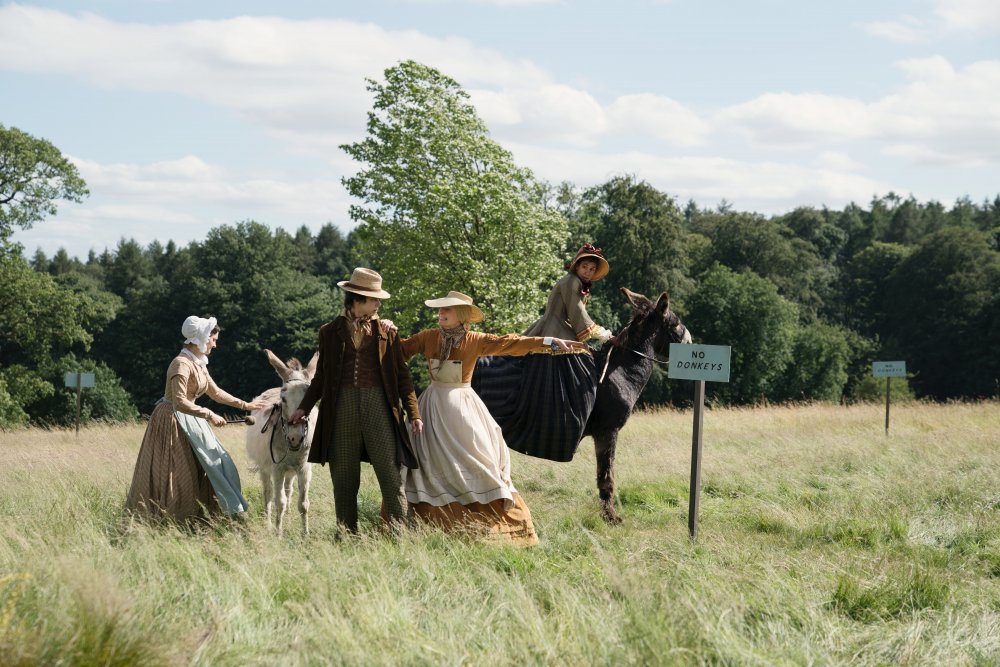
Dickens was very hyperactive – I think he was bipolar, actually. So he’d be really staring at people he’s observing for the first time, then go and mimic them in the mirror, and then write it down. His kids talked about that they could hear their father upstairs writing, because they could hear all these voices in the room!
So yes, we thought we’d try to use that, because the book itself is the most autobiographical. And you know, David Copperfield, DC is an inverse of Charles Dickens, CD. And of course, he is a writer…
Dickens was a polymath, wearing a variety of different creative hats, not unlike you. Do you feel a certain kinship in any way? Or if he were around today, do you think that he’d be doing similar work to yours?
Oh, I don’t know. I don’t want to compare myself to him, but I’m inspired by him. That idea that you can write your big works, but also the fact that he can be a journalist, comment on social issues, that you can care or express your passion, you can analyse.
Also he’s not afraid to take on the big topics. In Little Dorrit he invents this whole Circumlocution Office, which is like the civil service and Whitehall, and I love that.
You wish he were around to watch what’s going on today, Britain, the Prime Minister…
Yeah, he’s a kind of Dickens character. I mean, in the worst way. That’s why when people say, “Oh, Dickens exaggerates,” well, look around you. He doesn’t really, he just observes. And he heightens. But actually we all know a Micawber or a Murdstone.
-
The 100 Greatest Films of All Time 2012
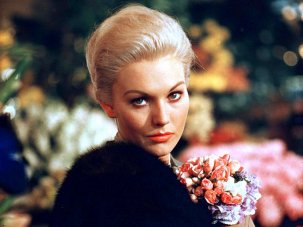
In our biggest ever film critics’ poll, the list of best movies ever made has a new top film, ending the 50-year reign of Citizen Kane.
Wednesday 1 August 2012
-
The Digital Edition and Archive quick link
Log in here to your digital edition and archive subscription, take a look at the packages on offer and buy a subscription.




